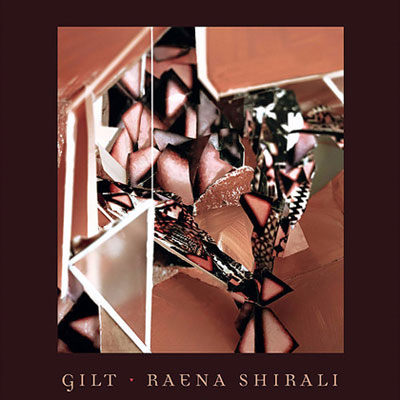Gilt by Raena Shirali / YesYes Books / 978-1-936919-41-3 / 2017
 I remember the conditioning well. Women teaching me the ways of being woman. Being clean. Most importantly, unseen. Gilt opens a window to gender ideologies embedded into the fabric of our society. Women teaching girls how to be a desirable wife. How to go with the flow. But that’s not all that Raena Shirali is concerned with in her debut collection. We see the violent history of men and women. The taking of woman’s body for pleasure and as punishment. Then we see the reclaiming of body. The reconditioning of what it looks like to be woman.
I remember the conditioning well. Women teaching me the ways of being woman. Being clean. Most importantly, unseen. Gilt opens a window to gender ideologies embedded into the fabric of our society. Women teaching girls how to be a desirable wife. How to go with the flow. But that’s not all that Raena Shirali is concerned with in her debut collection. We see the violent history of men and women. The taking of woman’s body for pleasure and as punishment. Then we see the reclaiming of body. The reconditioning of what it looks like to be woman.
Gilt is split into four parts, or phases. For me, they are the conditioning, the breakdown, the reclaiming of self, and the leaving. Shirali opens the collection with the image of an elephant at a wedding in “the procession.” “i know what will happen to the promises/ we girls make. we say we’ll never leave/ the herd, but the ceremony will end with a party/ where they flaunt their dates while i smoke a cigarette where the elephant once stood.” We enter a change in the life of the speaker. The life of the women around the speaker. Young girls becoming women. Wives. In my circle of women, we make promises to each other that we won’t change when we have a partner, but those promises are wishful thinking at best. The speaker knows of the danger that lies ahead, but, like all of the other women, chooses to push that aside to follow the festivities.
In “How to Marry a Guja,” the speaker reminds women to “Leave a window open when making batata vadas/ or bhel puris, or he will leave you smelling of onion and shame.” The conditioning. I use to watched my mother, my auntie, and the married women at church separately plate each part of their husbands meal. This was the sign of a good wife. Fresh salad with thousand island dressing to start. Du riz piled high on a plate. Poule nan sos and sos pwa in identical bowls. And iced jus grenadia. This was how you satisfied your man’s hunger, or someone else would.
The conditioning provides nameless brides that “could be anyone decked out in crimson: jeweled, gold/ chain draped from nose to temple, connected/ by piercings— signs that purity can still/ sink in.” like in “Adorn.” In “flow,” the speaker details how far going with the flow took her: “I went with the flow once/ at a party in college & the next day threw all/ of my tank tops, every strappy thing/ I could find.” Shirali gives us multiple faces of a conditioned woman in “if i wrap myself in gold.” We get lines like “SARI/ instead of the white gown i will/ not wear out of fear or respect/ for a god with cerulean blue skin,” that contrast with “RING/ the elders say i look ready/for it//i have improved,” and “LEAF/ i am my own tableau:/ madonna, portrait of a loverless/ bride.” The speaker becomes the bride that is expected of her. Shirali demonstrates the conclusions of the conditioning: “The way I made myself stop singing,” in “The Downing.”
In phase two of Shirali’s Gilt, we see the breakdown of the woman’s body. In “ghost pepper,” the speaker recounts a moment that reminds her of the rough skin of ghost peppers: “the night a white boy bit down on my lip, held my hands in place & let my screaming get swallowed with my own blood.” The speaker is in a cycle that they can’t get out of. “& it was cruel not just because I needed no reminder / of the scars a boy can leave. it was cruel because i have this history with lovers:” The speaker shows the parallels between ghost peppers and the “jagged men with light skin” that could and have taken things from her, the feeling of her own body.
Shirali continues this phase with the speaker in “to miss america” comparing her body to Miss America’s, which I also read as the literal missing of an ideal American beauty. The speaker’s body idealizes America’s body. Remembers when her own was small enough to hold a thin sash to its frame. So much so that in “i hate to break it, body,” the speaker asks, “remember when we were chiffonade-sparse,/ a thimble in a crowd/ of bowls?” There is a yearning in the speaker to return to this body. The ideal version of a beautiful woman.
In “feet planted” the speaker is in a state of change. Shirali’s woman is changing. “look at the beast/you’re becoming, pulling yourself in two/ directions, one with each hand.” “your body, the same color & tone/ as the mud surrounding it.” Shirali is referencing the ongoing practice of witch hunting in some parts of rural India. This reference is seen more heavily in the following poem entitled “black magic”:
the village men fear my evil mouth: so-called daayan
feeding on cattle, stirring dust to stifle crops.
i am single. have no man to stand
his two feet on top of my ground & reassure:
i am no danger.
me with the lotus painted on her bedroom wall. me the she-devi,
cast lower
& lower, until i endin dirt.
The reclaiming of self is always difficult for women. Popular culture shows us How Stella Got Her Groove Back, but it is only after the conditioning. After the complete breakdown of woman, her body, her home. The reclaiming of self takes so much longer to enter and get a real grasp on. Relapses come easy. “we waded/ toward them, knowing the best way/to make a mark is to accept with open arms. /Knowing no one would pay what this cost.” From “Kopili, 8:30am.” No one can pay, but we do it anyways. Better to already see it coming? This is a part of the conditioning. The breakdown. In my experiences as a woman, it’s been difficult to reclaim something I didn’t know belonged to me. It was difficult, in the same way, to enter a relationship where my woman, my body, or my home, could be claimed.
In “DARE I WRITE IT,” Shirali’s speaker states that:
…i will show my tits
to the neighborhood boys so they shut up about the sand, so they stop
chasing me sown in their pickup trucks yelling run, nigger run until i turn
to face & correct them: SAND-nigger
Throughout this poem, the speaker conflicts with how she is perceived and who she is. Her friends are white girls who see her darker skin and label her a nigger, despite knowing that she is not. “ain’t a difference,” says the speaker’s friend. But she does identify with sand. A justification for her friend’s lack of understanding that not all people that look alike are the same. Not all women are the same. In my reading of this poem, it was important for me to take into context Shirali’s identity as an Indian American woman born in Houston, Texas and raised in Charleston, South Carolina, and how Gilt offers the experiences of Indian and Indian American women specifically. Shirali’s speaker is friends with white girls, but as she is running from the boys spilling racial epithets out of the pickup truck, she stands in solidarity with women of color.
In “the woods,” the speaker is on a rowboat with an unidentified “you” and identifies with the trees in the water. “i want to say/ it’s uncanny how they root underwater, ask, how can they live in murk like that?” These questions feel like a callback to the conditioning and the breakdown. How can women live in murk like that? With men like that? The speaker’s body is covered in bruises, and “you’re trying to prove/ we won’t sink.” Uncertainty starts to creep into Shirali’s pieces from here. In “death on the coast,”the speaker is “free of the ache i once harbored:/ the boy who called himself mine briefly, & then didn’t/ call me anything at all.” But also believes that it is her fault. Maybe something she forgot from conditioning? Maybe something she reclaimed from the breakdown? In “monsoon season, one,” Shirali give us an image of the body reclaimed. “here is my body becoming/ an island. here is my body/ becoming itself.”
The leaving can cycle you back through the conditioning, the breakdown, the reclaiming of self, and back again to the leaving. This is what it’s like to be alone and be lonely. “ARE YOU A WOMAN FOR SOCIETY?” does an audit on the speaker’s performance as a wife:
AKA: when sipping chai on a muggy day, do you:
A. dab your upper lip with linen
or
B. curse your cãcĩ , from who you inherit
your tendency to sweat it
In the final stanza, the speaker assumes that “you probably enjoy your first cup of the day alone.”
Shirali wrote “From our Bedroom” for the victims of the 2008 attacks on the Taj Mahal Hotel and Oberoi Trident, as stated in the notes section of Gilt. The following poem “K.R. Revisitis Room 623” was also set during the 2008 attacks on Taj Mahal Hotel, and is for K.R. Ramamoorthy. In both poems, we see the main speakers alone in a room, praying their bodies won’t be taken by the men with guns outside. The rid themselves of their earthly possessions, phone numbers, hidden gold jewelry, in hopes that they could leave the room and enjoy life. In both poems, their reality is entrapped within the room we find them in. Their bodies. Their home.
The most heart-breaking poem for me was “CROWD/ GIRL.” In the notes section of Gilt, Shirali states that this poem
is for the tenty-year-old woman who was gang raped “on a raised platform in front of her entire village” as “punishment for having a relationship with a muslim man, who was not part of the community” (The Independent).
The poem is viewed through two different lenses: the viewing of the punishment, and the voice of the woman being punished. Here, our speaker is among other women who observe, offer their chants, but “don’t say a word.” This piece offers no change in the rules and justifications of this society. The woman has reentered the breakdown after seemingly leaving this cycle all together. She has found a man from another village who is kind, “a gentleman.” In her own agency as woman, free to leave her body in the hands of the man she wants, she has become unfit for her own society. “men whose faces i have known/ for years//men swarm, lash, beat.” Both the woman, and her lover are punished in this piece to restore order within their society. The reconditioning,
Gilt continues to explore the depths of loneliness within women who find themselves alone. From “Aubade”: “This summer,/ I live in a plash of various salts from your body. I burrow/ despite your leaving.” In “Eight Ways to Forget Your Name,”
it’s comforting
to me
knowing
that it comforts you
knowing
most nights
I hug a cold pillow.Knowing no one’s
scratch marks
zigzag my back.
In “monsoon season, two,” the speaker addresses a woman whose future as a woman of society doesn’t seem promising. Misfortune is coupled with a promise of destined darkness.
…you obsess over the crow cawing
through the thin glass like some omen, & dream of a quality of sunshine
that never existed for him, forgetting how all the while rain
hasn’t once touched your blessèd head.
Shirali’s Gilt ends with a speaker who has removed herself from the cycle of conditioning, breakdown, and reclamation of body, starting a “New Year as an Extremphile.” “Fuck the so-called return to nature: its verdancy, its promise/ that things will continue to grow.” The speaker speaks of girls in other countries: “a girl dances in flashing lights on the last day of the year, her short dress flaring/ up.” The speaker has removed herself from the society she knew, and “follow[s] the borehole to lake’s/end.” This speaker is content in this newfound home. This newfound body. “I find the newest opacity on record/ & plunge further into the ice cream.”
In solidarity, I am all the women in Raena Shirali’s Gilt. The woman who is conditioned as a girl to carry herself delicately to be foldable and ready for a husband. The woman whose body is misused and abused for the pleasures of men. The woman who reclaims her unfamiliar body, with an understanding that the reclaiming is never easy. The woman who finds that loneliness may be only way that she is free. That is home.





Leave a Reply